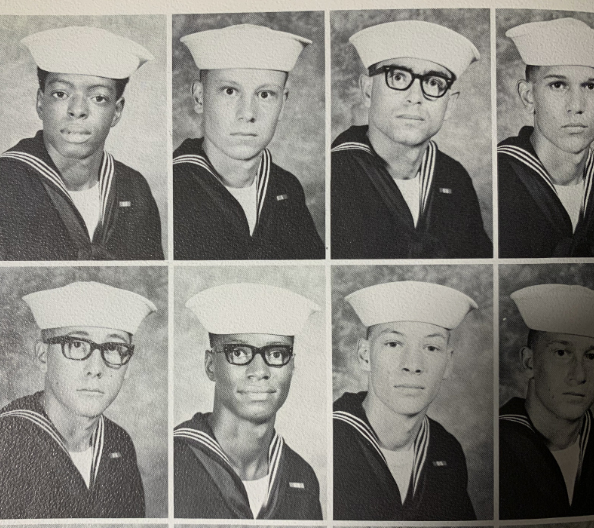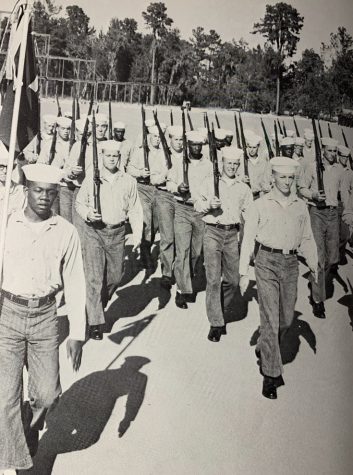
Photo Credit: Photo courtesy of Kyla Davidson
Mr. Bonner was drafted into the U.S. Navy at age 19 to serve in the Vietnam War.
BLACK HISTORY MONTH FEATURE: Grandfather Tells Story of Resilience
Growing up in the South was not easy, especially as a young black boy from Gadsden. And with living among such heavy loads of hatred and racism, along with other people in other Southern states, can make one feel like an outcast to society. This is the story my grandfather, Bennie James Bonner, Jr., told me last week.
Growing up as a young child and having parents who also understood the harsh reality of racism, helped ground Bonner and his family. Having leaders and ministers step out in faith is what Bonner believes truly inspired him to endure.
“I felt somewhat protected, because we had a lot of leaders standing up against racism. Because of the men and women who stood up in that day, I felt protected from it. My parents were straight forward with things happening to the black community,” Bonner said.
Bonner loved escaping Gadsden to visit his cousins in Aliceville. Although he left his hometown on a segregated bus, he valued spending time with his grandfather on the ride.
“I rode Continental Trailways. Caring for all our relatives is what made black people strong. My grandaddy always met me when I got off the bus and we would ride all the way to Aliceville. I liked farming because I liked people,” Bonner said, “Growing up I would make toys for my cousins and friends, I could make skateboards, scooters. They would bring them to me and I would fix them.”
Some things could not be kept from Bonner. When Civil Rights activist William Moore crossed into Gadsden on his way to Mississippi in April 1963, he was shot by a member of the Ku Klux Klan. Bonner knew this was a big event in the fight for equality as it brought Dr. Martin Luther King, Jr. to town.
“We were marching back in 1963. That year is when Mr. William Moore was killed up near the Kena community between Gadsden and Atalla. Moore was shot by a klansman. They traced the bullet back to the gun, the gun back to the man, but there was no conviction,” Bonner said. “Dr. King coming to town just inspired me.”
With people in Gadsden getting beaten up by the police and state troopers for no reason, Bonner, his friends and his community continued fighting for equal rights. Bonner remembers a particular incident where they were protesting at the courthouse and the leader of the state troopers, Al Lingo, ordered for the protestors to be beaten. That was in the summer of 1963.
“They considered the protests civil unrest, but it wasn’t. They just used it as an excuse because they wanted to keep the south segregated. They were trying to get the Voters Right Act passed and the Civil Rights Act of 1964 passed by President Lyndon Johnson. They had protests like these in different cities,” Bonner said.
Later Bonner will experience a day he will never forget–April 4, 1968. That is the day he learned the news that Dr. King was assassinated.
“When we got the news that Dr. King was assassinated, it was sadness and a lot of people cried. I was in Miss Plant’s classroom at Nancy E. Oden Junior High School. I was in the sixth grade. And a lot of people’s eyes were full of tears,” Bonner said.
Bonner said the community really came together at times to help their town grow into a more accepting place. He said black, Latino, white and all other races and religions gathered at times.
“They used to have a gathering at Agricola Shopping Center. People, white and black, came together. Blacks who did not have jobs helped work there. The center was new then, at that time it was three years old. It took away discrimination and brought racial relations as they had many fun events like battle of the band,” Bonner said.
At age 19, the Vietnam draft came calling. Bonner had already completed his application to join the United State Navy when drafted. He says it was one of the best experiences of his life.
“It wasn’t always easy. We had a big fire when our ship was about 2,000 miles away from Good Capt in South Africa. It made me fearful because we had a sister ship that had a first and 300 people died,” Bonner said. “Another trying time was seeing my friend die in Vietnam.”
He also experienced discrimination while serving his country.
“Yes, there was some discrimination directed towards me. And I responded to it with humility. I would not let racism make me act out of character. Humility was the vehicle to help keep me calm.” Bonner said.
It was fitting that Bonner marry a young lady that held his passion of fighting for Civil Rights. Josephine remembers why she knew she had to do more than stand by and allow racial injustice happen to her loved ones–her people.

“The discrimination was that we were treated differently, we were called names just walking, had dogs released on us, and we didn’t have much,” Josephine said.“When we were young teens, we would pass a white man’s house and he would send his black bulldog on us, we would take off running. And when we would go downtown a white man would stand out there and call us, *racist term*.”
Josephine, too, participated in marches and protests.
“I participated in marches in Gadsden. It made me feel like it was something that had to be done in order for things to be changed. I don’t remember seeing people getting hurt, but I do remember seeing people going to jail,” Josephine said.
Bonner says the most difficult thing about living in this time period was people not accepting him or the Black community as full citizens. He was so happy when times changed and Blacks were able to eat in restaurants and sit on busses without being fearful.
“ I felt good to see the process. Many others were happy to see it, your Jewish people and Episcopal people, some of them were white and your ministers. Many of the white community were angry and upset,” Bonner said.
He left me with one remark to pass on. Despite racism, he still had many white friends and continues to do so.
“I would like for them to know that even in those times of racism I still had many white friends and still have today. It’s important because being able to be friends with other races had a lot of impact in those days. And it had value as far as racial relation,” Bonner said.
